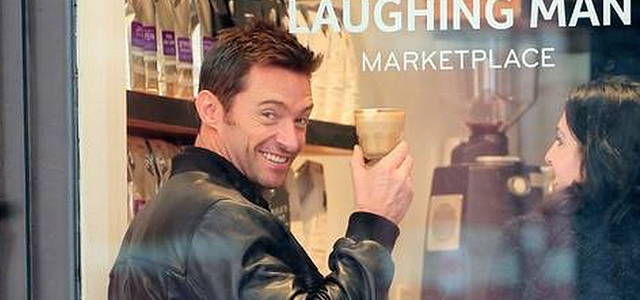In a recent trip to New York, I sought out an unassuming coffee shop in the Tribeca area. My goal was to uncover what a Laughing Man, fine coffee and Hugh Jackman had in common.
Laughing Man is the coffee company of the famous on-stage performer and screen actor. The story of his involvement in the coffee business began in 2009, when Hugh and his wife, Deborra-lee Furness, travelled to Ethiopia as ambassadors for World Vision. As long-time donors, they wanted to visit a community development project to see how rural communities were being empowered to eradicate poverty.
Hugh was inspired by seeing 27-year-old coffee farmer Dukale working to move his family out of poverty. On behalf of farmers, he promised to on advocate in developing countries for them to only drink fair trade coffee. And, so, Laughing Man was born.
Laughing Man recently partnered with one of the world’s largest purchasers of fair trade coffee — Keurig — to distribute their products all over the world.
In partnership with Jackman and his Lee-Furness, director Josh Rothstein has produced a documentary called Dukale’s Dream, Named after a blend of coffee sold at Laughing Man Coffee and Tea in Tribeca, the documentary was launched in 2015.
‘It doesn’t matter where we come from, what we want is opportunity,’ says Jackman of the documentary and the experience. ‘This is about livelihood, this is about change, and this is about hope.’
Hand up, not a hand out
Through the lens of Dukale’s Dream, you begin to understand what many non-profit organisations and companies in the coffee industry already know: our world is connected. Our sisters and our brothers live in villages, sleep in huts, struggle for running water. They need “a hand up —not a hand out,” explains Jackman.
Development is the root of change that empowers people to expand their own lives through communal sustainability. What will bring communities out of crushing poverty is strengthening them through education, training, mentoring and growth, from new opportunities.
Transformation can then occur all along the supply chain, going beyond just telling the story of the coffee we drink as part of our everyday rituals.
The power of sustainable change means getting the end user fully vested in the acceptance that they have the power to transform lives. There is no doubt that this is a small microcosm of the work that can be done to transform lives from the ground up.
While visiting Hugh Jackman’s small shopfront in New York, it was clear that he is not trumpeting his work. But the coffee is great, and I realised that with every cup, a family is being helped. So much so that Laughing Man is growing and now has a second shopfront.
Behind the beans
Inspired in my own way, I wanted to find out more of the story of Dukale. So I sat down with Josh Rothstein during the launch of his Dukale’s Dream documentary in New York, to understand the journey of both the documentary itself and the passion for making a difference.
How did you become involved in telling the story of Hugh Jackman and Deborra-Lee Furness’ involvement with World Vision and, consequently, Dukale’s story?
Josh: I met Hugh at the Oscars in 2009 when he was preparing to be the host. I was following Hugh, documenting him for 15 straight days. We got to know one another on a creative and personal level and through that experience, [we had] some discussions about human rights and social and environmental issues… A couple months later, when Hugh and Deb were traveling off to Ethiopia, I was invited to travel with them, to document their journey.
Do you hope this film will educate people about the benefits of fair trade?
Josh: At its core, I think the film is largely an advocacy message for the benefits of fair trade. There are tremendous benefits for individuals living in the areas of greatest need. We hope by showing first hand Dukale’s experience and using Dukale as a model, that it will really connect Dukale as a face to the farmers and the growers and, therefore, translate to a greater sense of activation for consumers throughout the world.
The film and the story is a very simple way of tackling a world-wide issue by simply buying a coffee. Something people do every day.
Josh: It’s essential we all explore how, in our own lives, we can play a role in being active, ethical, advocates for the planet, for those in the greatest need.
One of the biggest take-aways [of the film] is to galvanise audiences and to engage people, motivate people, specifically, to purchase fair trade coffee. There are so many individuals from Fair Trade USA and many others who have been working in the space for decades and who have dedicated their lives to spreading the messages of the importance of fair trade and direct trade.
I hope that Dukale’s Dream galvanises a new generation and I hope that people realise that a small change can add up to having profound impacts on this planet.
Adrian Drayton














